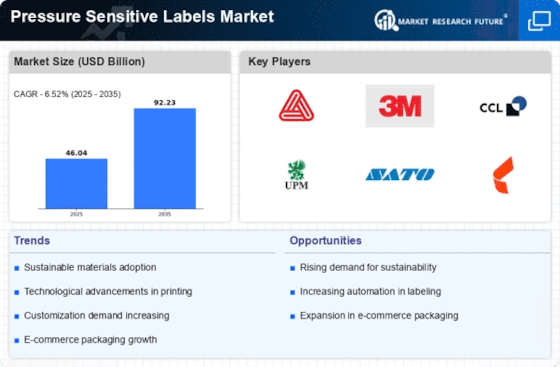Top Industry Leaders in the Pressure Sensitive Labels Market
 From branding your favorite beverage to tracking a crucial medical specimen, pressure-sensitive labels (PSLs) are the silent heroes of the modern world. These versatile, ubiquitous adhesives silently orchestrate a symphony of information and identification, clinging to everything from food packaging to circuit boards. The global PSL market is a vibrant battlefield where established giants and nimble innovators clash for label dominance. Let's peel back the layers and explore the strategies brands employ, the factors influencing market share, and the recent advancements shaping the future of this sticky landscape.
From branding your favorite beverage to tracking a crucial medical specimen, pressure-sensitive labels (PSLs) are the silent heroes of the modern world. These versatile, ubiquitous adhesives silently orchestrate a symphony of information and identification, clinging to everything from food packaging to circuit boards. The global PSL market is a vibrant battlefield where established giants and nimble innovators clash for label dominance. Let's peel back the layers and explore the strategies brands employ, the factors influencing market share, and the recent advancements shaping the future of this sticky landscape.
Strategies Sticking Out from the Crowd:
Material Innovation: Beyond traditional paper and plastic, companies like Avery Dennison and Fasson are pioneering sustainable materials like biopolymers and recycled papers. This caters to eco-conscious consumers and aligns with stricter environmental regulations.
Technological Advancements: From digital printing to in-mold labels, the PSL world is brimming with innovation. Companies like CCL Label are embracing smart label technologies, embedding RFID chips and QR codes for enhanced traceability, security, and consumer engagement.
Customization and Diversification: No two products are identical. Companies like Multi-Color Corporation offer bespoke label solutions tailored to specific shapes, sizes, and applications, from tamper-evident seals to heat-resistant labels for harsh environments.
Sustainability Focus: Environmental responsibility is no longer optional. Companies like Labelbox are leading the charge with compostable labels, recyclable materials, and energy-efficient printing technologies, minimizing waste and aligning with industry standards.
Data-Driven Optimization: From predicting label demand to optimizing logistics, data is becoming a game-changer. Companies like Toppan Printing are utilizing data analytics to streamline production processes, reduce waste, and improve overall efficiency.
Factors Shaping the Market Share:
-
Performance and Functionality: Labels must adhere firmly, resist abrasion and chemicals, and maintain clarity for information display. Companies offering solutions that excel in these areas gain an edge. -
Cost-Effectiveness and Scalability: While innovation is crucial, affordability remains paramount. Companies optimizing production processes and offering scalable solutions for high-volume needs attract a wider customer base. -
Regulations and Safety: Stringent regulations regarding food safety, tamper-evident seals, and hazardous material labeling influence market dynamics. Companies complying with these regulations gain access to valuable markets. -
E-commerce and Direct-to-Consumer Growth: The rise of online shopping is creating new demand for tamper-proof and informative labels for product identification and tracking. Companies catering to this segment gain a competitive advantage. -
Regional Market Dynamics: Demand for PSLs varies across regions. Developed economies with established manufacturing industries remain dominant, but Asia-Pacific holds significant growth potential due to its rapid urbanization and expanding consumer base.
List of the Key Companies in the Pressure Sensitive Labels market include
Constantia Flexibles Group GmbH
Henkel AG & Co. KGaA
Avery Dennison Corporation
CCL Industries Inc.
Technicote Inc.
Lintec Corporation, 3M
NSD International
UPM Raflatac
Inland Label and Marketing Services LLC
NAStar Inc.
Reflex Labels Ltd.
Recent Developments:
-
September 2023: The European Union announces new regulations regarding food packaging safety, pushing companies to adopt innovative tamper-evident labels for food products. -
October 2023: Fasson partners with a leading pharmaceutical company to develop a customized heat-resistant label with integrated RFID chip for tracking and monitoring sensitive medical supplies. -
November 2023: CCL Label introduces a smart label platform with near-field communication (NFC) technology, enabling interactive product information and consumer engagement. -
December 2023: Multi-Color Corporation acquires a promising startup specializing in digital printing technology, expanding its capabilities for on-demand and personalized label solutions.










